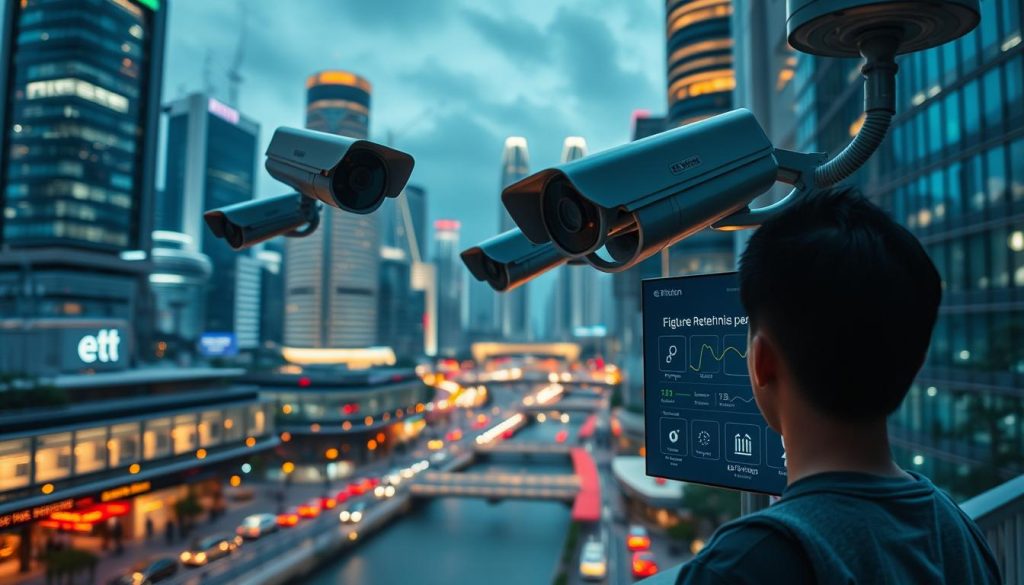Ever thought about how long CCTV footage is kept in Singapore? It’s important for your privacy and security. Knowing the CCTV storage duration in Singapore is key, with the country boosting public surveillance. Over 90,000 police cameras are being updated, and more than 200,000 will be added by the mid-2030s.
This increase in surveillance is aimed at improving public safety. But, it also brings up questions about data protection and following local laws.
Both businesses and individuals need to understand how long they must keep footage. The Personal Data Protection Act (PDPA) requires proper consent and storage. This is important for those using surveillance systems.
Want to know more about the factors affecting retention duration and CCTV guidelines? Keep reading to learn how to stay compliant and keep your property safe.
For more help and the latest CCTV solutions, contact ED Viston today at +65 8313 4578.
Key Takeaways
- The retention period for police camera footage is usually 31 days, with exceptions for ongoing investigations.
- New regulations mandate installation of Video Surveillance Systems (VSS) on larger construction sites.
- Over 90% of the public supports the use of police cameras for safety in Singapore.
- Obtaining consent is key under the PDPA before recording individuals through CCTV.
- CCTV systems can impact crime rates, but studies show mixed results.
Understanding CCTV Footage Retention in Singapore
CCTV footage retention is key for businesses in Singapore. The CCTV footage retention requirements Singapore say that places must keep surveillance footage for a certain time. This helps with both work needs and following the law, like the Personal Data Protection Act (PDPA).
Starting June 1, 2024, big construction sites in Singapore must use Video Surveillance Systems (VSS). This is to make sites safer, as about £800 million worth of materials are stolen each year. It shows how important it is to follow rules about storing surveillance footage in construction.
Construction sites will use CCTV that keeps clear images for 180 days. This helps spot safety risks quickly. Not following the VSS rules could cost up to $50,000. It’s very important for companies to know their CCTV rules.
Having clear rules for keeping footage helps with legal cases. CCTV can also save money by cutting down on the need for guards. Plus, insurance might go down because of the lower risk of problems.
Surveillance systems can do more than just watch. They can help with things like checking visitors and training staff. Companies in Singapore should really get to know the Singapore surveillance footage storage regulations to keep safe and follow the law.
For more info on CCTV solutions and deals, call ED Viston today at +65 8313 4578.
Data Protection Laws for CCTV Footage in Singapore
The Personal Data Protection Act (PDPA) is key to Singapore data privacy laws for video surveillance. Companies using CCTV systems must follow strict rules about personal data. The guidelines were updated on 31 March 2022 to clarify how to handle CCTV footage.
Before starting surveillance, companies must tell people about CCTV cameras. They need to say where the cameras are and why they are there. This is important for being open and following data protection laws for CCTV footage in Singapore.
Recorded footage must also follow privacy laws, even in public areas. People can ask to see the footage, but access might be refused in some cases. This could happen if it might harm security or reveal business secrets.
If many people want to see the same footage, they can ask together. Companies must delete footage when asked and give it in formats that meet certain standards.
With the rise of drones, collecting personal data becomes more complex. Data Protection Officers play a bigger role in ensuring companies follow privacy laws. This shows a strong commitment to protecting personal data and meeting legal standards.
For companies wanting to learn more about CCTV and compliance, getting expert advice is key. Contact ED Viston today at +65 8313 4578. They offer the latest CCTV solutions and services that fit your needs.
How long is CCTV footage kept Singapore?
The time CCTV footage is kept in Singapore changes based on several factors. These include the setting, the reason for watching, and the type of recording system. Knowing these helps people and businesses decide how long to keep CCTV footage. This ensures they follow the law and meet their needs.
Factors Affecting Footage Retention Duration
Several things affect how long CCTV footage is kept in Singapore:
- Type of Environment: Homes usually keep footage for at least two weeks. But, businesses must follow rules from the Media Development Authority. They need to keep footage for at least 30 days.
- Purpose of Surveillance: The reason for using CCTV affects how long footage is kept.
- Technical Specifications: The quality of the recordings also plays a role. It determines how long you can store the footage.
- Storage Capacity: What you use to store the footage matters. Options like DVR, NVR systems, SD cards, or cloud storage all impact how long you can keep it.
Guidelines for Residential vs Commercial CCTV
The right time to keep CCTV footage differs for homes and businesses:
| Type of Setting | Recommended Retention Period | Notes |
|---|---|---|
| Residential | At least 2 weeks | Primarily for homeowner security and privacy. |
| Small Businesses | At least 2 weeks | Usage mainly as a deterrent against theft. |
| Commercial | Minimum 30 days | Compliance with regulatory standards. |
| Large Corporations (e.g., Banking) | 30 to 90 days, up to 6 months in some cases | Extended retention for legal and security obligations. |
Businesses in Singapore need to have clear rules for keeping data. They should follow the Personal Data Protection Act (PDPA). It’s wise to talk to experts to figure out the best storage plan and make sure it’s legal.
To learn more about CCTV solutions and offers, call ED Viston today at +65 8313 4578.
CCTV Storage Solutions Available in Singapore
In Singapore, many CCTV storage options meet various needs. They mix old and new tech. DVRs and NVRs are key for storing and getting footage.
DVRs use coaxial cables for strong connections. NVRs use wireless tech for easy access. Cloud storage is also popular, known as one of the best CCTV storage methods. It’s great for growing businesses because it’s scalable, reliable, and easy to reach from anywhere.
The Personal Data Protection Act (PDPA) guides how CCTV footage is stored. It makes sure data is safe and kept only as long as needed. This law helps use tech wisely, keeping security and privacy in balance.
The table below shows main features of popular CCTV storage solutions in Singapore:
| Storage Type | Data Transmission | Accessibility | Scalability | Ideal For |
|---|---|---|---|---|
| DVR | Wired (Coaxial) | Local Access | Limited | Small to Medium Businesses |
| NVR | Wireless | Remote Access | Moderate | Medium Businesses |
| Cloud Storage | Internet-Based | Remote Access | High | Large Organizations |
Looking to boost your security with CCTV storage? It’s key to pick the right one for your needs and business size. Call ED Viston at +65 8313 4578 to learn more about CCTV solutions and get ones that fit your needs.
CCTV Footage Retention Requirements Singapore
Businesses in Singapore must follow CCTV footage retention rules. Knowing these rules helps them stay legal and keep their security systems up to date. Companies need to follow these rules to avoid legal trouble and handle security issues well.
Minimum Retention Period for Businesses
The minimum time to keep CCTV footage is usually 30 days. This is key for dealing with security issues. If a problem happens, businesses might need to look at the footage to solve it. Not keeping footage long enough could lose important evidence.
Retention Norms for Specific Sectors
Some areas, like banking and finance, need to keep footage for at least six months. This is because financial security is very important. Each industry must think about its needs and follow the CCTV rules in Singapore.
If you’re unsure about following these rules, get help. Call ED Viston at +65 8313 4578. They can tell you about the latest CCTV solutions and offers that meet legal standards.
Legal Implications of Retention Policies
Organizations face a complex legal landscape with CCTV footage retention. The legal consequences can be severe. It’s vital to follow Singapore’s data protection laws to protect your business.
Ignoring CCTV retention policies can lead to big penalties. The Personal Data Protection Act (PDPA) sets rules for handling data. Not following these can result in fines up to $1 million.
It’s important to tell people about CCTV use. There are rules for where and what to say. Being open helps avoid legal trouble and builds trust.
In some cases, you might not have to show CCTV footage. It’s key to have clear policies for such requests. For example, MCSTs must show footage but protect privacy.
When consent is needed, like for job data, you must have clear steps. Keeping records for job applicants is a good example. It shows balancing data retention with individual rights is important.
So, protecting data well is a must. MCSTs need to use strong security to keep data safe. Recent breaches show the dangers of not following data protection laws.

Understanding the legal implications of CCTV retention policies is key for staying compliant and protecting your reputation.
To follow the PDPA, review your CCTV policies. For expert advice and CCTV solutions, call ED Viston at +65 8313 4578.
CCTV Recording Length Singapore: What You Need to Know
Knowing how long CCTV recordings last is key for good surveillance in Singapore. To find out, how long is CCTV footage kept Singapore?, we must look at several factors.
Most CCTV systems record continuously until they’re full. At home, footage is usually kept for about two weeks. Businesses should keep recordings for at least 30 days. This helps with both work needs and legal rules.
New rules require all construction sites worth over $5 million to have CCTV by June 2024. These systems must record in HD and keep footage for 30 days. They also need to keep recordings for 180 days after any safety incidents.
Recording times vary by setting. In shops, following the Personal Data Protection Act (PDPA) is important. It tells employees about surveillance, which can change how long recordings are kept. Offices must balance privacy and security while following the law.
For help with CCTV systems that meet local laws, check out expert services. They offer installation, upkeep, and support for many security systems.
In short, knowing how long CCTV footage is kept in Singapore and the guidelines for footage recording duration is critical. It makes sure your system works well and follows the law.
Best Practices for Safe CCTV Footage Storage
Keeping CCTV footage safe is key for companies to guard their interests and respect people’s privacy. Good safe CCTV storage practices help keep data secure and follow data protection laws. There are many ways to store footage, each with its own pros and cons.
Methods of Safe Storage
Companies can pick between storing footage on-site or off-site to improve their CCTV footage management strategies. On-site options like DVR/NVR systems and external drives give quick access. Cloud storage, on the other hand, is great for growing needs and remote access. Here’s a look at different storage options:
| Storage Method | Advantages | Disadvantages |
|---|---|---|
| DVR/NVR Systems | Quick access; low latency | Small storage; at risk of theft or damage |
| External Backup Drives | Easy to carry; simple to manage | Needs physical protection; data can be lost |
| Cloud Storage | Accessible from anywhere; always updated | Costs keep coming; depends on internet |
To add more security, companies should use data encryption and access controls. This stops unauthorized viewing of footage. Regular checks and updates of security steps help follow the Personal Data Protection Act (PDPA) in Singapore. For better CCTV solutions, contact Wenhong or call ED Viston today at +65 8313 4578 for the latest choices and deals.

Conclusion
Understanding CCTV footage retention policies in Singapore is key for both following the law and keeping places safe. The rules on keeping CCTV footage vary a lot. This depends on the type of business and the CCTV systems used.
Businesses need to create their own rules for keeping CCTV footage. This helps them follow the law and keep their places secure.
It’s important for companies to know their legal duties and the best ways to follow them. This includes knowing how to store CCTV footage well. Companies like Kirin CCTV and Hikvision offer technology that can keep footage for up to 118 days.
For more help and to learn about new CCTV solutions, call ED Viston at +65 8313 4578. Taking action now can improve your security and make sure you follow Singapore’s CCTV rules.
FAQ
How long is CCTV footage kept in Singapore?
What factors influence the CCTV footage retention duration?
What are Singapore’s data protection laws for CCTV footage?
Are there specific regulations for CCTV footage retention requirements in Singapore?
What are the common storage solutions for CCTV footage in Singapore?
How can organizations ensure compliance with CCTV footage retention policies?
What are the legal implications of failing to adhere to CCTV retention policies?
How long do CCTV systems generally record footage?
What best practices should be followed for safe CCTV footage storage?
Source Links
- https://www.channelnewsasia.com/singapore/police-cameras-tender-launched-double-number-200000-mid-2030s-3882691
- https://www.mom.gov.sg/workplace-safety-and-health/safe-measures/sectoral-level/video-surveillance-system-for-construction-sector
- https://coruzant.com/security/navigating-the-legalities-of-cctv-installation-in-singapore/
- https://www.edviston.com/secure-builds-with-construction-site-cctv-in-singapore/
- https://mediaonemarketing.com.sg/reasons-business-needs-surveillance-cameras-cctv-in-singapore/
- https://www.pdpc.gov.sg/-/media/Files/PDPC/PDF-Files/Advisory-Guidelines/AG-on-Selected-Topics/Advisory-Guidelines-on-PDPA-for-Selected-Topics-310322.ashx?la=en
- https://www.pdpc.gov.sg/-/media/Files/PDPC/PDF-Files/Press-Room/2016/media-release—organisations-can-better-protect-pd-(200716).pdf
- https://web.securitysystem.com.sg/how-long-can-cctv-footage-be-kept/
- https://www.ismartcom.com/blog/pdpa-compliance-and-cctv-surveillance-legal-considerations-in-singapore/
- https://web.securitysystem.com.sg/cctv-camera-for-hdb-flat/
- https://www.keydence.com/services/cctv-camera-security-surveillance
- https://www.d-ron.com/articles/cctv-cameras-in-singapore-for-offices/
- https://web.securitysystem.com.sg/cctv-law-singapore/
- https://www.pdpc.gov.sg/-/media/Files/PDPC/PDF-Files/Legislation-and-Guidelines/FINAL-Advisory-Guidelines-on-PDPA-for-Selected-Topics-31-August-2018.pdf
- https://infinitylegal.com.sg/pdpa-and-mcst/
- https://www.privacy.com.sg/resources/good-data-protection-practices/
- https://entrycare.com/cctv-law-singapore/
- https://www.cctvsg.net/cctv-footage/
- https://www.cctv-camera.com.sg/articles/dos-and-donts-of-installing-a-cctv-system-in-singapore.html
- https://www.secom.com.sg/products-services/cctv-surveillance-system.html
- https://www.firstsolution.com.sg/choosing-the-best-storage-option-for-your-office-cctv/
- https://www.firstsolution.com.sg/blog/how-to-legally-install-cctvs-in-singapore/
- https://kirincctv.com/secure-your-office-with-advanced-cctv-in-singapore/

